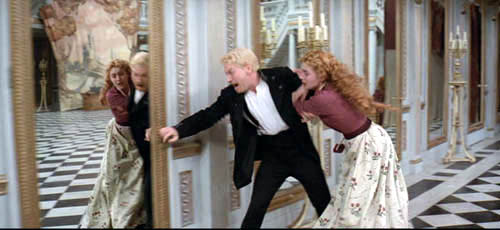
Hamlet and Ophelia, being spied upon, while conversing.
You will be taking a test on Act I, including a short matching vocabulary. Below is the vocabulary you need to know. This is an extension of what was due last Friday. The questions had been previously posted.
For Tuesday, 25 September, please read the Act III.i. In particular, notice Hamlet's famous, "To be or not to be" soliloquy. Youi will also receive the second vocabulary packet, which will be due on Tuesday, October 9.
Reading schedule: Wednesday, 26 September- finish Act III
Thursday, 27 September Act IV scenes i-iv.
Friday, 28 September finish Act IV
Monday, 1 October finish Act V. Act II. review
Reading schedule: Wednesday, 26 September- finish Act III
Thursday, 27 September Act IV scenes i-iv.
Friday, 28 September finish Act IV
Monday, 1 October finish Act V. Act II. review
Act II.ii. Gertrude and King Claudius have called two friends of Hamlet's, Rosencrantz and Guildenstern, to the court to cheer Hamlet up. They agree, and, afterwhich, Polonius pops on the scene to say, " I have found / The very cause of Hamlet's lunacy"(51-2). Note how the councillor talks endlessly, and we have his ironic statement "brevity is the soul of wit." Polonius is both a laughable and sympathetic character. Polonius admits that he has told Ophelia that "Hamlet is a prince, out of thy star"; hence with Ophelia's spurning him, he has lost his reason.
So they devise a plan to check out the validity of this thought: "He'll loose [his] daughtet to [Hamlet / ..and " behind an arras then / Mark the encounter" (176-8).
Polonius meets Hamlet and the prince calls the old man a "fishmonger", a slang term for a pimp. Essentially, Hamlet plays word games with Polonius, but Ophelia's father is no putz and observes 'Though this be madness, yet there is / method in 't"(II.ii.223-24).
Comic and serious note: When Polonius tells Hamlet he must take leave, the prince retorts: You cannot take from me anything that I / will more willingly part withal- except my life.
Hamlet catches up with his friends Rosencrantz and Guildenstern; he extracts from them the truth that they have been summoned by the king and queen. Important line: ..."but there is /nothing either good or bad but thinking makes it / so"(I.ii.268-69),
Hamlet on life: "I could be bounded in a nutshell and / count myself a king of infinite space, were it not / that I have bad dreams"(II.ii.273-75).
Guidenstern on dreams: ambition... is merely the shadow of a dream.
Hamlet reveals his mental state to his friends in II.ii 326-334. These lines as well celebrate the majesty of being human. PLEASE NOTE CAREFULLY.
His friends reveal that there are players coming to the castle. They show up and Hamlet interacts with them, recolecting a particular play. Polonious is on the scene and he is bored. Hamlet wants him to use the players, but not necessarily to their "just desserts", for according to the Prince, "Use everyman affter his just dessertand who shall 'scape / whipping? (II.ii.556-57).
Act II.ii ends with a soliloquy. Hamlet is in the throws of angst: O what a rogue and peasant slave am I... He devises a plan, concluding "The play's the thing / Wherein I'll catch the conscience of the King"(633-34).
Act I vocabulary
apparition: a supernatural appearance of a person or thing, especially a ghost
avouch: guarantee
auspicious : prosperous; fortunate.
comart: bargain; covenant
obsequious: obedient; dutiful.
jocund: cheerful, merry, glad
beteem: to give; grant
tenable: capable of being held, maintained, or defended
calumnious: slanderous; defamatory.
cautel: craft; deceit; falseness.
libertine: a person who is morally or sexually unrestrained,
dalliance: amorous toying; flirtation.
censure: strong or vehement expression of disapproval
sepulcher: a tomb, grave, or burial place.
importune: to beg for (something) urgently or persistently.
enmity: a feeling or condition of hostility; hatred; ill will; animosity
pernicious: Ruinous; evil; wicked
No comments:
Post a Comment